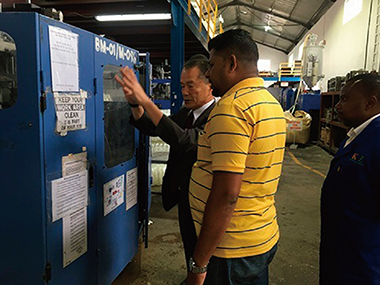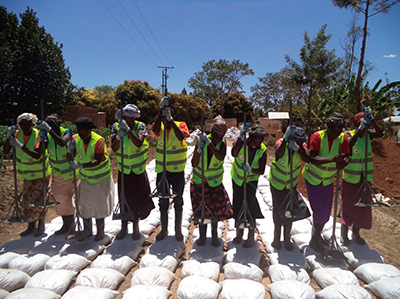(2) Vocational Training, Industrial Human Resources Development, and Employment Creation
To support quality growth in countries, it is essential for their populations to acquire the necessary vocational skills. In developing countries, however, opportunities to receive quality education and training are limited. Moreover, the ineffective use of human resources tends to stifl e opportunities for earning sufficient income. A shortage of appropriate human resources, thus poses a major obstacle to industrial promotion and industry development.
“Work” constitutes a fundamental activity of mankind that shapes society. Increasing income by getting a job (employment) is an important means for improving the living standards of people. Nevertheless, the global employment situation is uncertain, and although the unemployment rate is expected to decline slightly in 2018, the number of unemployed is expected to remain fl at at over 192 million. Additionally, another 1.3 million are estimated to become unemployed in 2019. In order to create stable employment under these circumstances, each country must urgently prepare for risks by building social safety nets, as well as engage in an international effort to realize “decent work,” established as Goal 8 of the SDGs.
■ Japan’s Efforts
●Vocational Training and Industrial Human Resources Development
Based on requests from developing countries to develop human resources who can respond to diverse needs in technology and related technical skills, Japan provides support to leading polytechnic and public vocational training schools, which will serve as core centers in each country. In implementing this assistance, Japan, in cooperation with the private sector, supports the capacity building of teachers and trainers, the reinforcement of the operational capacity of training schools, and curriculum improvement, in order to further strengthen the linkages between education and employment.
In the field of industrial human resources development, Japan implemented 63 comprehensive cooperation projects in 31 countries between 2000 and 2018. The projects drew on Japan’s insight and know-how for the development and revision of curriculums and teaching materials, capacity enhancement of trainers, and collaboration with the industry sector. As a result, Japan provided support for improving facilities and equipment at 12 schools in six countries, as well as Technical and Vocational Education and Training (TVET) institutions. Japan also contributed to skill development through 14 projects in eight countries, with the aim of improving the livelihoods of women, the disabled, demobilized soldiers, as well as refugees and others whose lives have been impacted by confl ict.
Upon highly exceeding the goal of developing 40,000 industrial human resources in three years under the “Industrial Human Resource Development Cooperation Initiative” announced at the Japan-ASEAN Summit Meeting in 2015, with a view towards the 50th anniversary of ASEAN-Japan Friendship and Cooperation in 2023, Japan announced the “Industrial Human Resource Development Cooperation Initiative 2.0,” at the November 2018 Japan-ASEAN Summit Meeting which aims to develop 80,000 industrial human resources in the Asia region over the next five years. The initiative calls for new cooperative fields, which include cooperation in digital fields such as AI, in addition to cooperation in practical technology, design and development capabilities, innovation, management, planning and management capabilities, that have been emphasized. In addition, at TICAD VI in 2016, Prime Minister Abe stated his intention to leverage Japan's expertise in high-quality, and to go ahead with human resource development for approximately 10 million people within three years, between 2016 and 2018.
Furthermore, under the “Japan Revitalization Strategy 2016” (decided by the Cabinet in 2016), with the aim of contributing to fostering innovation in both Japan and developing countries in Asia, Japan decided to launch a new initiative (“Innovative Asia” Initiative) for circulation of competent human resources between Japan and Asian countries offering study opportunities and internships in Japan for approximately 1,000 talented students from Asia over five years from FY2017. This new initiative was highly welcomed by partner countries on occasions such as summit meetings. Under the initiative, 152 people came to Japan for training in FY2017, and 74 in FY2018.
As for the Ministry of Health, Labour and Welfare (MHLW), it conducts trainings and etc. in Japan primarily for Southeast Asian countries (Note 3), with which Japan has been expanding and deepening economically interdependent relationships. The trainings are designed to transfer the government and private sector’s accumulated know-how on Japan’s skills evaluation system (Japan’s National Trade Skill Test and Certification), with a view to strive for developing and securing a quality workforce (Note 4). In FY2017,a total of 260 people from six countries participated in these training programs. The training is expected to develop and improve skills evaluation systems in these countries, which in turn will promote the development of their skilled workers and elevate their social standing through increased employment opportunities.
In addition, through Japan’s voluntary contributions to the International Labour Organization (ILO), the ILO’s Skills and Employability Programme in Asia and the Pacific (SKILLSAP) conducted surveys, studies, and seminars regarding vocational training policies, vocational training methods, and vocational training information networks, which were attended by members of governments, employers, and worker organizations across countries in the region.
●Zambia
National KAIZEN Project Phase 2
Technical Cooperation Project (July 2017 – July 2020)

Japanese expert inspecting the status of the implementation of KAIZEN activities (Photo: JICA)
Zambia’s industrial structure has been a problem, as it is highly reliant on copper resources, which are highly influenced by international market conditions. Therefore, to address this issue, the government has been working on establishing an attractive environment for investors, by providing them with incentives, and planning and enhancing its complex special economic zone, with an aim to promote economic growth by diversifying Zambia’s industry through increased foreign investment.
The private sector in Zambia is made up of a small number of large companies and a large number of micro, small and medium enterprises (MSMEs). Large companies are structured to be able to pass high production costs onto their sales prices, but most of the domestic industry, which is primarily made up of MSMEs, is stuck with low productivity.
In response, Japan introduced the KAIZEN approach, a common practice in Japanese workplaces wherein small groups proactively implement quality control activities by themselves. This approach has started to be widely rolled out in Zambia. In Phase 1, which preceded this project, the KAIZEN Institute of Zambia was established to promote the dissemination of KAIZEN activities. Japan also supported the capacity-building of the organization and its personnel. The present cooperation project, Phase 2, is enhancing systems for the continuous spread and expansion of KAIZEN, and contributing to improved quality and productivity in both the private and public sectors, through efforts to implement a system for the sustainable dissemination and expansion of KAIZEN, particularly by implementing activities to disseminate this approach nationwide and strengthening the KAIZEN instructor training system.
●Employment

A road maintenance project being carried out using sandbags, in support of sustainable job creation and independence of youth in Kenya (Photo: NPO CORE: Community Road Empowerment)
Japan also provides support in the area of employment. The question of how to address issues such as response to serious industrial accidents that occur frequently, and protecting the rights of workers and stabilizing employment amidst the expansion of the global supply chain, is a common issue for each country. In light of this, the improvement of the working environment from a global perspective is becoming an increasingly important issue. To cope with these problems, Japan provides technical cooperation that supports developing countries primarily in Asia, focusing on the enhancement of security and hygienic standards of work, as well as improvement of employment legislations and its implementing systems for the improvement of working environments, through means such as voluntary contributions to the ILO. Japan is also engaged in realizing “decent work,” such as by providing support in Africa, including support for youth employment in Gambia.
- Note 3: Indonesia, Thailand, Viet Nam, Myanmar, Cambodia, and Laos
- Note 4: There are two types of training in this project: “training for people in charge of the creation of test standards and test problems” and “training for people in charge of tests and marking.” The number of participants above is the total value for both of these types of training.
